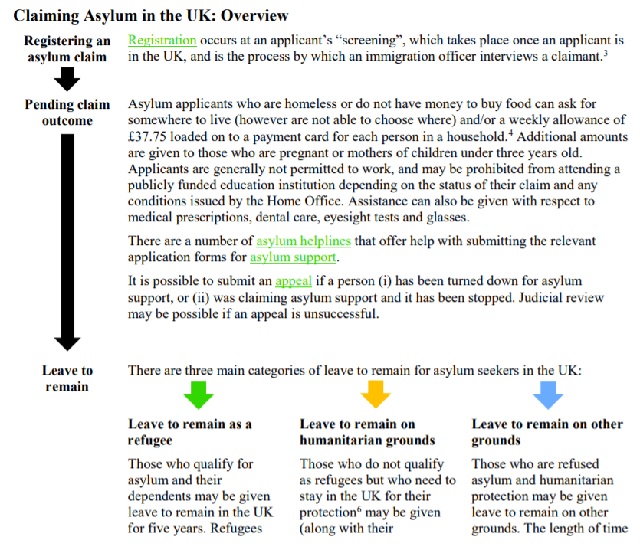Overview
- A UK asylum application can have several possible outcomes, including:
-
- Permission to stay as a refugee;
- Permission to stay for humanitarian or other reasons; or
- Requirement to leave the UK.
- Individuals with registered asylum claims have certain rights pending the outcome of their claim. These rights may change once their claim is determined, depending on its outcome.
- Certain primary medical care and treatment is available free of charge to all, irrespective of immigration status or age.
- Refugees and asylum seekers are exempt from charges that are otherwise payable for some types of medical care.
- Asylum seekers generally do not have a right to work. Refugees and persons granted humanitarian protection are able to work.
Introduction
Cleary Gottlieb participated in the Financial Times Global Legal Hackathon 2020 (Hackathon) and responded to an immigration challenge: "How to assist asylum seekers who have been significantly impacted by the COVID-19 crisis?"1 This memorandum is a product of the firm's submission to the Hackathon and is aimed at charities and organisations who assist refugees and asylum seekers. It is intended to be supplemented by additional materials directed at individual asylum seekers and refugees, which may take hard copy and/or digital forms.
Asylum seekers and refugees in the UK may be unsure of their rights to access healthcare and to work. The
COVID-19 pandemic likely exacerbates such uncertainty. This memorandum sets out the various stages of the UK asylum claims process, together with an overview of the corresponding rights to access healthcare and to work.
Basic terminology
Refugee.A refugee is a person who has successfully applied for asylum. The 1951 Convention Relating to the Status of Refugees defines a refugee as "any person whoowing to well-founded fear of being persecuted for reasons of race, religion, nationality, membership of a particular social group, or political opinion, is outside the country of his nationality, and is unable to or, owing to such fear, is unwilling to avail himself of the protection of that country [...]".2

1 Cleary Gottlieb's Hackathon submission, Guide for Asylum seekers in the UK during COVID-19, accessible at: https://challenge.globallegalhackathon.com/gallery/5ec840c9136ce600448b0f96 . clearygottlieb.com
2 Article 1, the Convention Relating to the Status of Refugees, 1951 .The Convention is considered the foundation of international refugee law.
3 See UK Government guidance,Claim Asylum in the UK, for information on the asylum application procedure, accessible at:https://www.gov.uk/claim-asylum.
4 For more information, seehttps://www.gov.uk/asylum-support/what-youll-get.
6 Paragraph 339C of the Immigration Rulesrequires the
Secretary of State to be satisfied, among other things, that "substantial grounds have been shown for believing that the person concerned, if returned to the country of return, would face a real risk of suffering serious harm and is unable, or, owing to such risk, unwilling to avail themselves of the protection of that country."
To read the full article click here
Originally published 26 June, 2020
The content of this article is intended to provide a general guide to the subject matter. Specialist advice should be sought about your specific circumstances.


